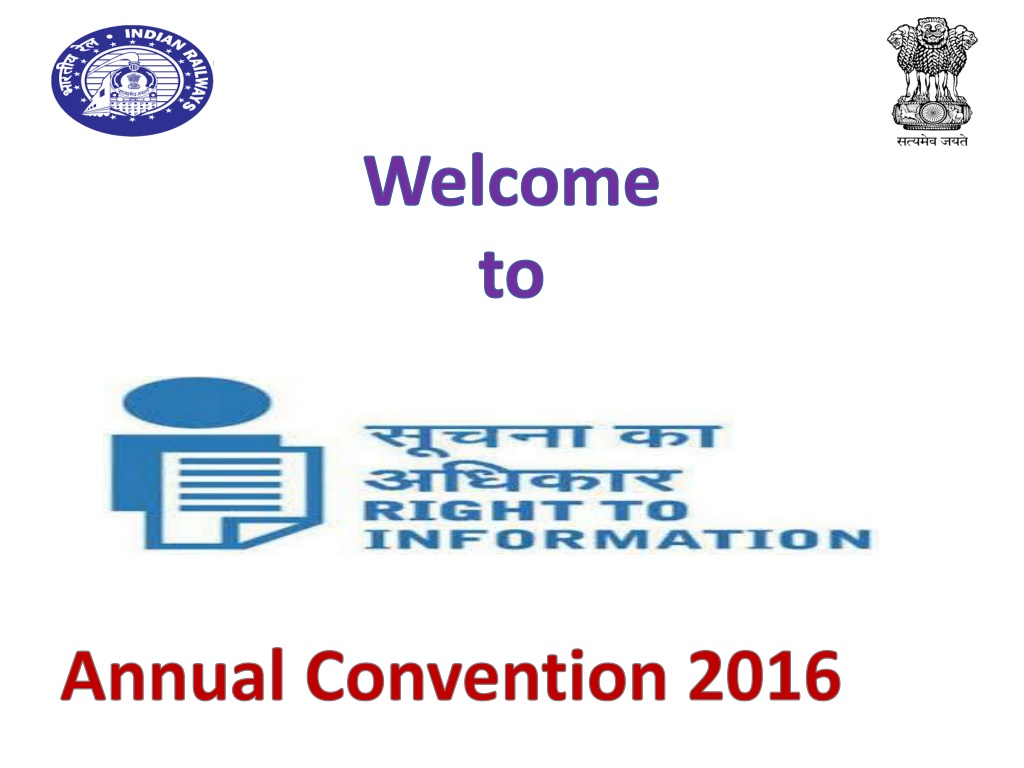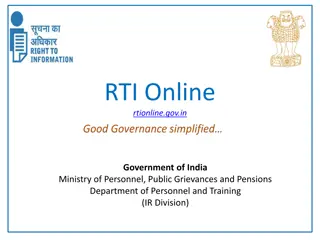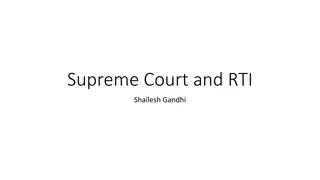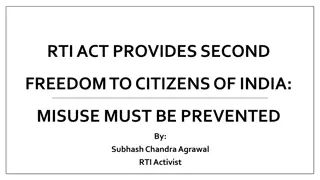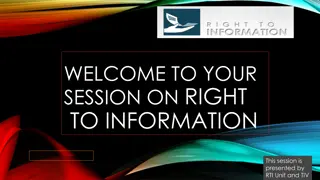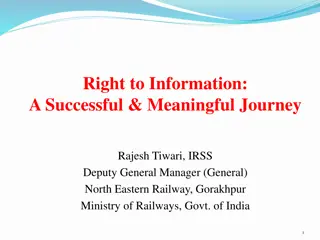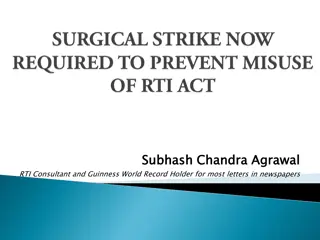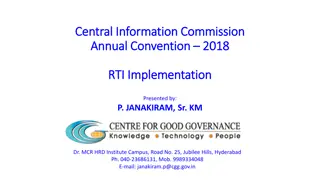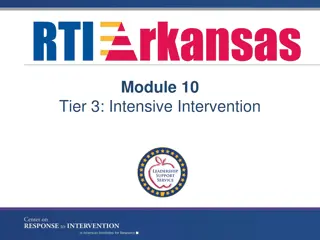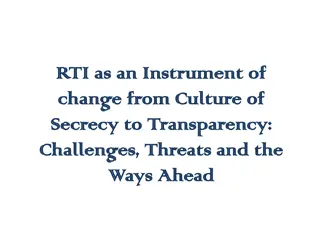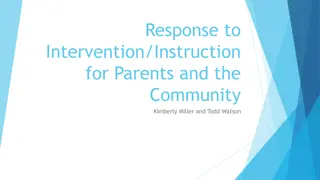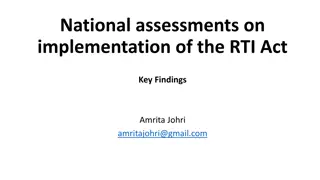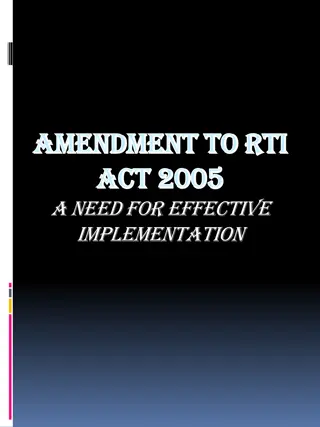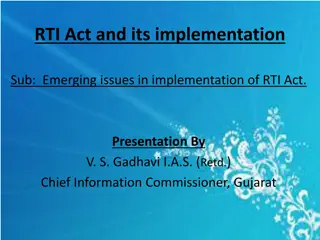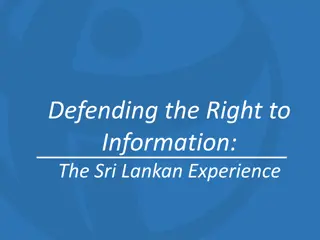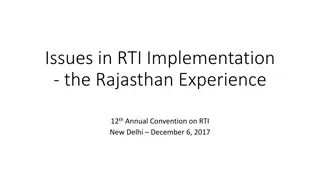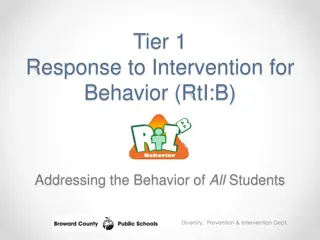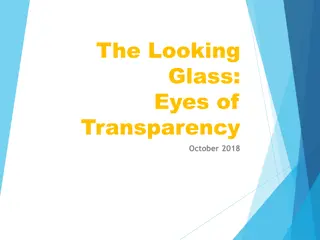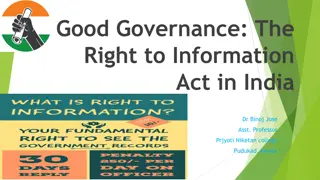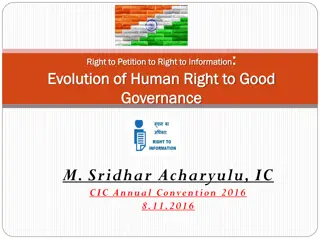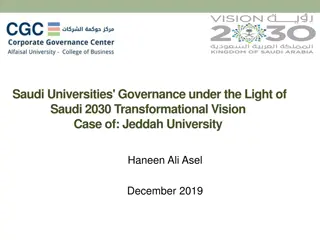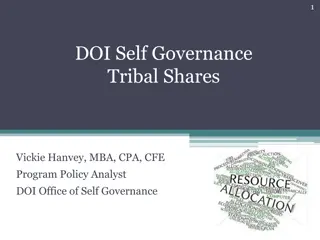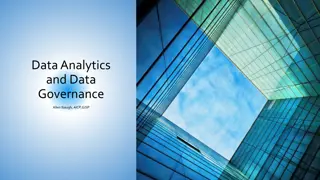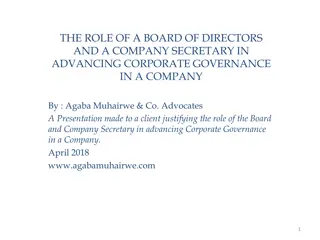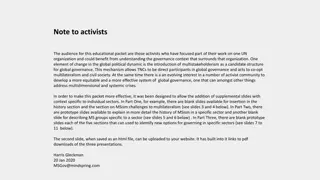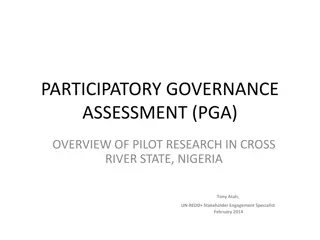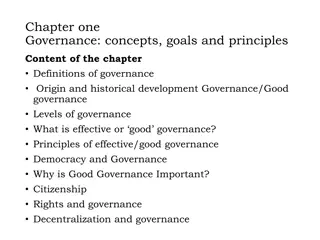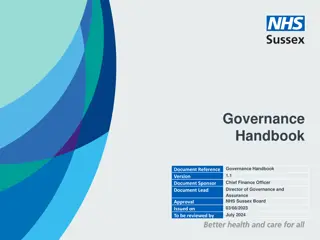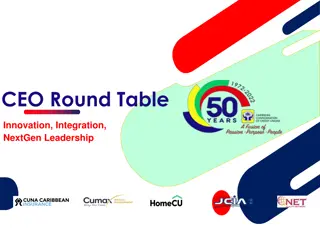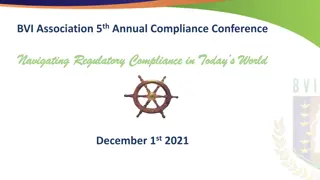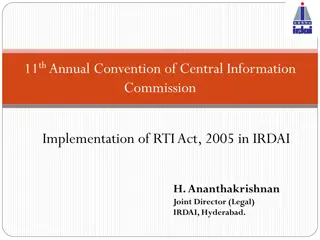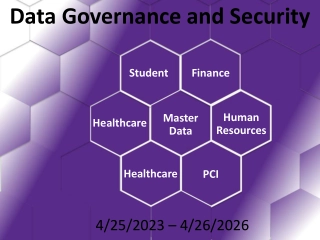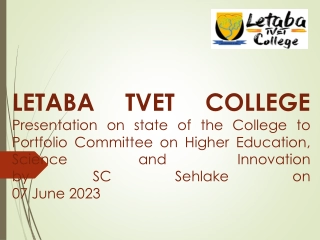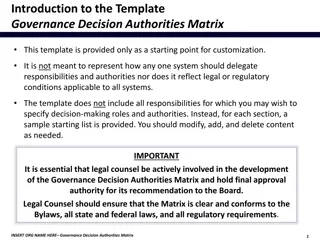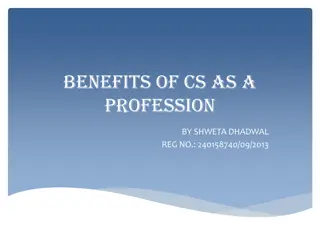Importance of Right to Information (RTI) Act in Governance
The Right to Information (RTI) Act of 2005 in India has been a crucial tool in enhancing transparency, accountability, and citizen participation in governance. It empowers the public to engage with their representatives and government, combat corruption, ensure good governance, and promote public accountability. The Act has been instrumental in promoting openness, integrity, and responsiveness in government operations, ultimately strengthening the democratic fabric of India.
Download Presentation

Please find below an Image/Link to download the presentation.
The content on the website is provided AS IS for your information and personal use only. It may not be sold, licensed, or shared on other websites without obtaining consent from the author. Download presentation by click this link. If you encounter any issues during the download, it is possible that the publisher has removed the file from their server.
E N D
Presentation Transcript
Welcome to Annual Convention 2016
Journey of RTI Right to Information Act (RTI), 2005 is a revolutionary step by the Government of India to enhance the transparency and accountability in the government. The bedrock of a meaningful substantive democracy is an informed public that is able to participate thoughtfully in its own governance. India is the largest democracy in the world. Therefore, the access to information is vital for the public to engage their representatives and the bureaucracy on and ongoing basis to participate in the formulation and implementation of the policy made for the benefit of the peoples. Greater access of citizen to information leads to the greater responsiveness of the government towards the needs of community.
RTI at a Glance An effective accountability rests on peoples access to the information of the state and its affairs. A Government which operates in secrecy tends to lose the faith of peoples as much as its own legitimacy and credibility. Openness and full access to information are two pillars of democratic state. These empower the citizens to participate meaningfully in the development process. In this context and in order to strengthen the democratic fabric of india, the RTI Act 2005 was passed by the parliament and notified to come into force w.e.f. 12.10.2005.
Importance of RTI Good Governance Peoples Participation Combating Corruption Transparency and Public Accountability Empowerment of the common man.
Importance of RTI Lack of Transparency was one of the main causes for all pervading corruption and Right to information would lead to Openness, Accountability, and Integrity -Soli Sorabji, Former Attorney General of India
Indian Railways at a Glance Indian Railways is an Indian state owned enterprise, owned and operated by the Government of India through the Ministry of Railways. It is one of the world s largest railway networks comprising 115,000 km and 7,112 stations.
Indian Railways at a Glance Railways were first introduced to India on 16th April, 1853 between Mumbai to Thane Indian Railways was nationalized in year 1951 The country s first railway, built by the Great Indian Peninsula Railway It is the biggest employer in the world and the largest single undertaking in the country It has the second biggest electrified system in the world after Russia Indian Railways is comprising of 17 Zones and 68 Divisions
Indian Railways at a Glance Single largest civilian employer in the country with a (strength of 13.07 lakh dedicated workforce). More than 13000 passenger trains and around 9200 Goods Trains daily. More than 23 million passengers travel on trains every day. Glorious past of more than150 years serving the nation
Implementation of RTI in Indian Railways This law was passed by Parliament on 15 June 2005 and came fully into force on 12 October 2005. The 1st application which was received in IR was on 13th October 2005 . The Act covers the whole of India except Jammu and Kashmir, where J&K Right to Information Act is in force. The Central Information Commission (CIC), has held that the political parties are public authorities and are answerable to citizens under the RTI Act. August 2013 the government introduced a Right To Information (Amendment) and in October 2013 NIC Introduced RTI Online Portal.
ORGANISATIONAL SET UP OF RTI OVER INDIAN RAILWAYS Railway Board Level Zonal Railway Level Division Level APPELLATE AUTHORITY EXECUTIVE DIRECTOR APPELLATE AUTHORITY Addl. G.M. APPELLATE AUTHORITY OSD / ADRMs CPIO CPIO Dy. G.M CPIO Sr. D.C.M DIRECTOR APIO APIO A.C.M APIO Dy DIRECTOR) DY. SECRETARY/ADGM Workshop Level PSUs Level PUs Level APPELLATE AUTHORITY Addl. G.M. APPELLATE AUTHORITY CPO / CPLE / CDE etc. APPELLATE AUTHORITY GM/GGM/MD/ED etc CPIO C.W.M CPIO CPIO Dy. CPO / DGM / PRO etc GM/Dy. HOD/GGM etc APIO APIO APIO Dy. CPO / SPO DGM / PRO / Dy. Secy etc. ED / GM / Jt GM
No. of Officers Associated with RTI Railway Board Zonal Railway (17) Divisions (68) No. of Directorates 33 Appellate Authorities 226 Appellate Authorities 68 CPIOs / APIOs 136 PIOs 344 PIOs **816 Appellate Authorities 74 APIOs 331 APIOs **816 ** Major 12 departments X 68 Divisions Total 2844
PROCEDURES FOR HANDLING RTI Step-1 Receipt of RTI Applications through various medium- post, courier, mails, RTI portals, applicant/representative in person. Step-2 registered. Then they are scanned, uploaded and allotted a unique Id No. and transferred to the Nodal Officer of the concerned Department/Division/Workshop. concerned CPIOs send a reply directly to the applicant within 30 days. The applications received offline are checked, marked and Thereafter,
OFF LINE RTI CASES HANDLED AT RAILWAY BOARD (From Inception to June, 2016) Initial RTI 1st Appeal CIC 10000 9223 8623 9000 8616 8533 7967 8000 7228 7000 6000 5173 5000 4000 3000 2553 2408 2405 2358 2353 3000 1960 1870 2000 1314 839 1000 426 353 322 345 246 190 106 173 238 416 429 217 400 288 141 24 31 76 0 2005-06 (Oct.) 2006-07 2007-08 2008-09 2009-10 2010-11 2011-12 2012-13 2013-14 2014-15 2015-16 2016-June
Analysis of RTI Applications handled by Railway Board Total Number of Initial RTI application received by Railway Board since inception of RTI Act, 2005 till 30th June, 2016 is 63,852. Total Number of 1st Appeal received by Railway Board since inception of RTI Act, 2005 till 30th June, 2016 is 14,477. Total Number of 2nd Appeal received by Railway Board since inception of RTI Act, 2005 till 30th June, 2016 is 2,515. The percentage of 1st Appeal is 23% and the percentage of 2nd appeal is 4% of Initial RTI application. The above percentage shows that Public Authorities of Railway Board has been able to satisfy 96% of the RTI Applicant by reply given by CPIOs or/and 1st Appellate Authority.
ONLINE RTI CASES REGISTERED AT RAILWAY BOARD (Through NIC Portal www.rtionline.gov.in) Initial RTI Appeal 15192 9159 6112 3754 1533 1463 1115 503 2013-14 2014-15 2015-16 2016-June
Initial RTI Application & 1st Appeal handled by IR (From Inception to June, 2016) 120000 Initial RTI 1st Appeal 96984 100000 93069 90317 80000 (From 13.10.2005 to 30.06.2016) 70635 67195 60000 49113 39521 40000 35347 25506 23744 12056 20000 12145 10085 11400 8368 8802 6998 4345 6217 2420 2950 2665 1124 0 0 2005-06 (Oct.) 2006-07 2007-08 2008-09 2009-10 2010-11 2011-12 2012-13 2013-14 2014-15 2015-16 2016-17 (upto June)
Analysis of RTI Applications handled by Indian Railways Total Number of Initial RTI application received by Indian Railways (including Railway Board) since inception of RTI Act, 2005 till 30th June, 2016 is 6,05,496. Total Number of 1st Appeal received by Indian Railways (including Railway Board) since inception of RTI Act, 2005 till 30th June, 2016 is 75,510. The percentage of 1st Appeal is 12% of Initial RTI application on Indian Railways since inception of RTI Act, 2005 till 30th June, 2016. The above percentage shows that Public Authorities of Indian Railways have been able to satisfy 88% of the RTI Applicant by reply given by CPIOs.
DEPARTMENT WISE RTI CASES Details of RTI online- off-line applications dealt by Railway Board Dte No of cases dealt On-line Cases 601 1145 8772 105 2309 106 13482 282 105 1115 265 122 81 33 653 93 204 116 29589 S. NO. DIRECTORATES 1 ACCOUNTS Dte 2 ADMINISTRATION Dte 3 ESTABLISHMENT Dte 4 COACHING Dte 5 TRAFFIC COMMERCIAL Dte 6 TRAFFIC Dte 7 PG/RTI/ CLAIMS & TWITTER ACCOUNTS 8 T & C Dte 9 SAFETY Dte 10 CIVIL ENGINEERING Dte 11 MECH. ENGINEERING Dte 12 ELECTRICAL Dte 13 SIGNAL AND TELECOM 14 STORES Dte 15 MEDICAL Dte 16 SECURITY Dte 17 VIGILANCE Dte 18 OTHERS/CRB TOTAL Off-line Cases 2278 3951 12969 659 2285 305 21650 553 177 1825 511 251 142 335 705 2109 1687 189 52581 Sub-Total 2879 5096 21741 764 4594 411 35132 835 282 2940 776 373 223 368 1358 2202 1891 305 82170
APPLICATION RECEIVED IN LAST 3 YEARS (from 01.04.2013 to 31.03.2016) 60000 54186 50937 50000 Initial Application 40000 31763 28708 30000 27508 2081719974 186441852718171 20000 13852 10535 8957 7610 6864 10000 5313 4113 3675 0 RB SR WR NR CR NER NCR SCR ER WCR ECR PU/PSU ECOR SWR NWR NFR SECR SER Total number of RTI Applications received by Indian Railways (Railway Board, Zonal Railways, Pus, PSUs etc.) during last three financial years is 3,50,154. The top five recipients units of RTI Applications of Indian Railways (Railway Board, Zonal Railways, Pus, PSUs etc.) are Railway Board (15%), Southern Railway (15%), Western Railway (9%), Northern Railway (8%) & Central Railway (7.9%).
Departmentwise number of RTI Applications received by IR (from 01.04.2013 to 31.03.2016) 94677 100000 90000 Initial Application 80000 70000 60000 5152949528 50000 40000 27195 30000 18825 18613 18305161881447511531 20000 8262 6614 5499 4256 10000 4126 0 Total number of RTI Applications received by all Departments of Indian Railways during last three financial years is 3,49,623. The top five recipient departments of RTI applications are Personnel (27%), Commercial (15%), Stores (7%), General Administration (5%) and Safety (5%).
Top 10 Most Frequently Asked Information Service matters - Appointment, Service Book, Departmental Exams, Promotion, Transfer, Salary, Pay Fixation, Arrears, ACRs, APARs, Pension matter etc. Matters related to Tender Award of Tender & Contracts (Contstruction & Open Line), Railway Recruitment Board (RRB) & Railway Recruitment Cell (RRC) - Marks scored, Cut-off marks, Copy of answer sheet/answer key, recruitment, vacancies details etc. Personal Details (Third Party Information) - Salary, Property, Family particulars, Employee details, Medical status, Service particulars etc. of third party (Employees). Travel related matters - Reservation, Refund of e-tickets, Passenger Amenities & Services etc. Claim & Compensation related matters Claims for Non-receipt of Goods/ Parcels, Compensation for Accidents and untoward incidents, Ex-gratia etc. Information related to vigilance investigation/ DAR cases. Action taken on representations/letters/complaints by the applicant. Stoppage of trains, Change route matter, Punctuality of trains. Survey & Land related issues including Payment/Employment against land acquisition etc.
Success Stories In one of the departmental selections, an employee was declared as failed. Through RTI, he obtained a copy of his answer sheet and it was revealed that one of the answers was not evaluated. On representation, his grievance was found to be genuine and he was promoted. This is a case pertaining to Trivandrum Division of Southern Railway in the category of Guard. One of the Retd. Railway Officers had lost all his certificates. He got them through RTI which helped him register with the Bar Council of India and obtain `Sanad . He is now a practising Advocate at Mumbai. Applications made to the Nodal PIO resulted in removal of encroachments from the Railway land, apart from recovery of license fees and penal rent, wherever due. A fake bail bond scam was unearthed on one of the Zonal Railways based on RTI by one of the insiders, wherein huge money was embezzled by the RPF Personnel. On enquiry, the complaint was found to be genuine and disciplinary action was initiated against the staff of RPF resulting in their transfers from their existing place of postings. In one of the Zonal Railways, there were complaints against one of the Railway Doctors with regard to his competence and citizens requested for verification of his testimonials pertaining to his educational qualification. Upon verification, they were found to be fake and action was initiated against the fake Doctor. Contd /-
Success Stories RTI applications have resulted in finalising several pending payment cases, arrears cases, etc., related to pension, family pension, transfer grant, etc. Medical aid and availability of Ambulance, 24x7 at all suburban Stations of Mumbai, Raising of platform heights in Mumbai Suburban Sections of Western and Central Railways. All Service Records, Leave balance, payments, arrears etc. have been computerised. Publication of marks in the Written & Viva Voce in all Departmental and Open Market Selections/Recruitments, etc. E-Tendering & E-Auction of all purchases, payments, etc., Uploading of APARs on the website, Frequent announcements to the passengers for minding the gap between the platform and foot-board.
Road Ahead The online RTI is going to be strengthened for faster processing of RTI applications. With the implementation of the DoPT Portal RTI MIS, the manual transfer of RTI applications will stop and all applications will get electronically transferred to all Zonal Railways/Divisions, further adding to the efficiency. The integrated grievance redressal mechanism will reduce the number of RTI applications which are asked to resolve the grievances. The uploading of important circulars, notifications and information on social media will reduce the number of RTI applications.
